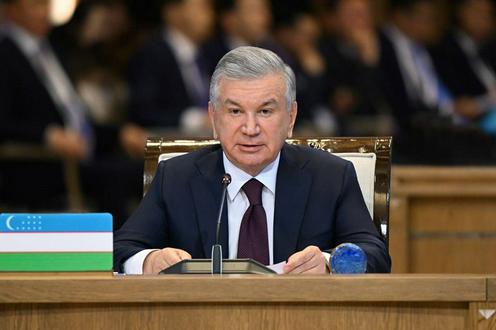Uzbek President Shavkat Mirziyoyev has proposed the establishment of a “Central Asia–China” Development Fund to serve as a platform for advancing infrastructure initiatives across the region. Citing a regional investment shortfall measured in the hundreds of billions of dollars, Mirziyoyev outlined the proposal during the China–Central Asia summit held in Astana on June 17, according to a statement from his press service.
The Uzbek leader also introduced a range of initiatives aimed at deepening regional cooperation with China. Noting the worsening global geopolitical climate, Mirziyoyev emphasized the historical significance of the Treaty of Eternal Friendship and Cooperation signed at the summit. As a next step, he proposed developing a long-term partnership framework incorporating specific mechanisms and joint projects.
Mirziyoyev highlighted that trade, investment, and technological cooperation with China are key drivers of Central Asia’s socio-economic development strategies. To strengthen this partnership, he called for:
✅ A new economic partnership program;
✅ The creation of an interregional trade and investment council at the level of prime ministers;
✅ A “Digital Silk Road” trading platform within the framework of the Digital Belt and Road;
✅ A regional center for industrial standardization and certification to align with Chinese regulations;
✅ A dedicated roadmap for technology transfer;
✅ A strategy for an “Industrial and Infrastructure Belt: Central Asia–China,” encompassing industrial clusters, technology parks, and logistics hubs.
He also emphasized the need for joint development of artificial intelligence and digital technologies as long-term growth drivers. This would require a network of integrated big data banks and processing centers, as well as a “Central Asia–China” fiber-optic communication corridor along key transport and energy routes.
On environmental cooperation, Mirziyoyev called for swift adoption of a green development program through 2030 and the formation of an ecological alliance to combat desertification, restore degraded lands, and improve resilience in arid zones.
Security remains a key concern. Mirziyoyev urged the international community to address the situation in Afghanistan and emphasized the importance of intelligence cooperation to combat terrorism, extremism, drug trafficking, illegal migration, and cybercrime.
Despite global tensions, Mirziyoyev noted strong momentum in Central Asia–China relations. Regular meetings among ministers and experts are taking place, and a legal framework for full-scale cooperation is developing. Trade volumes are growing steadily and are expected to reach $100 billion this year.
The second China–Central Asia summit took place on June 17 in Astana. Participants included Chinese President Xi Jinping and the presidents of Kazakhstan (Kassym-Jomart Tokayev), Kyrgyzstan (Sadyr Japarov), Tajikistan (Emomali Rahmon), Turkmenistan (Serdar Berdimuhamedow), and Uzbekistan (Shavkat Mirziyoyev).
At the conclusion of the summit, the leaders signed the Astana Declaration and the Treaty of Eternal Friendship and Cooperation, alongside a substantial package of intergovernmental and interagency agreements.










